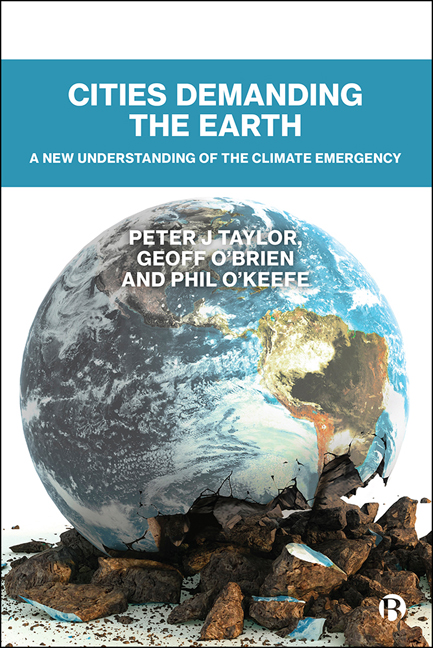Book contents
- Frontmatter
- Dedication
- Contents
- List of Tables and Figures
- About the Authors
- Preface
- 1 Declarations: Root and Branch Unthinking
- 2 Alternate: Jane Jacobs’ legacy
- 3 Inside Out: Fourteen Antitheses Authenticating Cities
- 4 Reset: Anthropogenic Climate Change is Urban, not Modern
- 5 Action: Can We Stop Terminal Consumption?
- References
- Appendix: Primer on Climate Change Policy
- Index
Preface
Published online by Cambridge University Press: 19 March 2021
- Frontmatter
- Dedication
- Contents
- List of Tables and Figures
- About the Authors
- Preface
- 1 Declarations: Root and Branch Unthinking
- 2 Alternate: Jane Jacobs’ legacy
- 3 Inside Out: Fourteen Antitheses Authenticating Cities
- 4 Reset: Anthropogenic Climate Change is Urban, not Modern
- 5 Action: Can We Stop Terminal Consumption?
- References
- Appendix: Primer on Climate Change Policy
- Index
Summary
There are many books on climate change and cities, so why another one? In this literature cities feature variously as victims (threatened by the rise of sea levels), solutions (compact living) and models (various new ‘green’ settlements), but always as adjuncts, effectively just add-ons, to the subject of climate change. The basic argument is that given climate change is happening, how are cities affected and what can be done about it?
Acknowledging Hassett's (2017: 14) wide-ranging evidence that cities have made us humans – as she states, ‘we haven't just built cities. Cities have built us’ – this book offers a completely different take: cities are the key human component in anthropogenic climate change. Our basic argument is that without cities, there would never have been anthropogenic climate change. So there – if you want to engage with this unique argument, read on. We think you should because to deal effectively with any emergency – and climate change is now an emergency – it is vital to understand the fundamental mechanism behind the crisis. And we might just be right.
Our book has been a long time in the making. The path to this text begins in 2010 when we three found ourselves together in the same academic home, the Department of Geography at Northumbria University in Newcastle upon Tyne. By coincidence we were in the process of researching and writing two books that were soon to be published: Taylor's Extraordinary Cities: Millennia of Moral Syndromes, World-Systems and City/State Relations (Edward Elgar, 2013) and O’Brien and O’Keefe's Managing Adaptation to Climate Risk: Beyond Fragmented Responses (Routledge, 2014). This book has its origins in our trying to bring together some of the core ideas of these two texts, the human potentials of urban agglomerations and connectivities, and the building of resilient communities to reduce risks from disruptive events. Although the original texts are very different, they shared common concern for holistic thinking, bottom-up practice and anthropogenic climate change. These starting points were consistent with others’ research agendas in the Department of Geography so that when The Leverhulme Trust invited bids to initiate a major research programme on climate change in 2013, we threw our hat into the ring.
- Type
- Chapter
- Information
- Cities Demanding the EarthA New Understanding of the Climate Emergency, pp. ix - xiiPublisher: Bristol University PressPrint publication year: 2020



